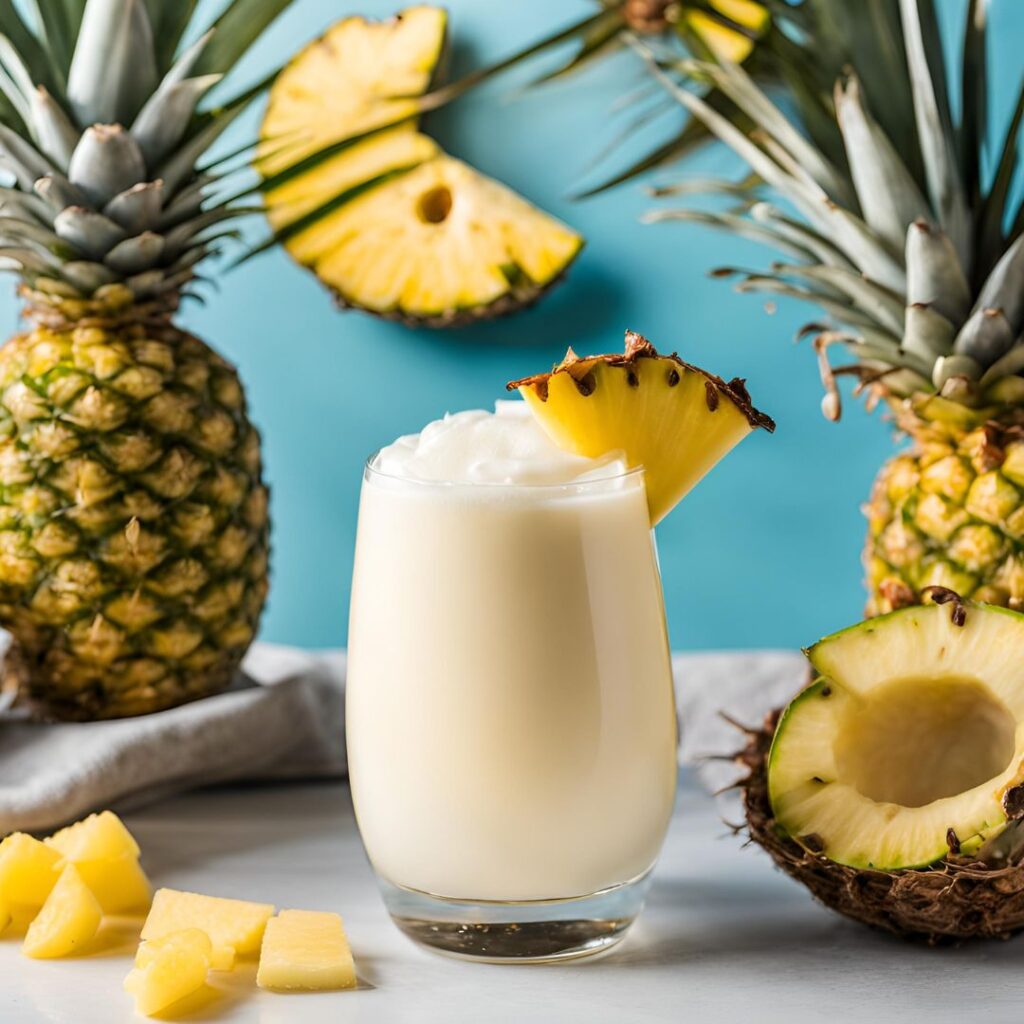

Pina Colada Recipe: The Ultimate Tropical Escape in a Glass. If there’s one cocktail that instantly transports you to a tropical paradise with each sip, it’s the Pina Colada. This iconic drink, often accompanied by vivid imagery of sun-drenched beaches, swaying palm trees, and vibrant sunsets, has earned its reputation as the quintessential summer refreshment. A creamy blend of pineapple, coconut, and rum, the Pina Colada has charmed cocktail enthusiasts for decades with its distinctive flavor profile. Its name, Spanish for “strained pineapple,” gives a nod to the core ingredient, while its taste offers an indulgent blend of sweetness and tropical warmth that makes it a beloved classic worldwide.
Originating in Puerto Rico, the Pina Colada’s story is just as interesting as the drink itself. This cocktail’s history is a blend of myth and legend, rooted in the island’s cultural and culinary heritage. Whether served at a luxury resort or made fresh at home, a well-crafted Pina Colada has the power to evoke memories of ocean breezes and island relaxation. But while it may seem simple at first glance, creating a perfect Pina Colada requires balancing flavors and understanding how each ingredient complements the other. In this article, we'll dive into what makes this drink special, the story behind it, and a guide to mastering a traditional Pina Colada recipe.
The Pina Colada’s origin story is shrouded in mystery, with at least two Puerto Rican bartenders claiming to have invented the drink. According to one legend, the cocktail was created in the early 1950s by Ramon “Monchito” Marrero, a bartender at the Caribe Hilton Hotel in San Juan. Marrero spent months perfecting the recipe to capture the island’s tropical essence. His version of the Pina Colada was so popular that it quickly gained fame, becoming a symbol of Puerto Rican hospitality and earning the status of the country’s national drink in 1978.
Another version of the story credits the drink to Ricardo García, another bartender from San Juan, who claims to have created the Pina Colada around the same time but with slightly different inspiration. Both stories emphasize the Puerto Rican origins of the drink and its close association with the island’s vibrant, sun-soaked landscape.
The Pina Colada is more than just a cocktail; it’s a flavor experience that combines creamy coconut, juicy pineapple, and smooth rum. The texture is rich and frothy, a result of blending or shaking ingredients to create a drink that's both thick and easy to sip. The use of rum adds a layer of warmth and depth, giving the drink a well-rounded finish that appeals to the senses.
Pineapple Juice: The heart of the Pina Colada, pineapple juice brings natural sweetness and a hint of tartness. Fresh pineapple juice is ideal for the most authentic flavor, but canned or bottled juice works well, too.
Coconut Cream: Coconut cream gives the Pina Colada its luxurious, silky texture. It’s richer than coconut milk and has a naturally sweet, nutty flavor that complements the pineapple. Some variations use coconut milk, which makes the drink lighter but equally refreshing.
Rum: Traditional Pina Coladas use white rum for a mild, smooth base. Dark rum can add a more robust, caramelized taste, which some prefer for a bolder drink. The type and quantity of rum can be adjusted according to personal preference, making the drink as light or as strong as desired.
Ice: Blending the ingredients with ice gives the Pina Colada a slushy consistency, perfect for warm weather. It also helps to dilute the drink slightly, making it more refreshing without overpowering the flavor.
Making a Pina Colada at home is easier than you might think, and it doesn’t require a lot of special equipment. A simple blender is all you need to create this delicious tropical treat. The best part about crafting your Pina Colada is the ability to customize it to your taste. Want it creamier? Add more coconut cream. Prefer a lighter drink? Substitute coconut milk and reduce the rum.
While the classic Pina Colada is perfect on its own, many creative variations have emerged to suit a range of palates. Here are some popular ways to customize your Pina Colada:
Frozen Pina Colada: Adding frozen pineapple chunks instead of ice will intensify the pineapple flavor and give the drink a thicker, smoothie-like texture.
Spicy Pina Colada: A dash of chili powder or a slice of jalapeño in the blender adds a touch of heat, balancing the sweetness and enhancing the tropical experience.
Herbal Twist: Adding a few fresh basil or mint leaves provides an herbal undertone that pairs well with the sweetness of the pineapple and coconut.
Coconut Water Pina Colada: Substitute some or all of the coconut cream with coconut water for a lighter, more refreshing version.
Non-Alcoholic Pina Colada: For a mocktail version, simply leave out the rum and add a touch more pineapple juice or coconut cream for richness.
The Pina Colada’s sweet and tropical notes make it a versatile drink to pair with various foods. It goes exceptionally well with spicy dishes like Caribbean jerk chicken, as the sweetness of the cocktail balances the heat. Other great pairings include fresh seafood, tropical fruit salads, or light snacks like coconut shrimp. For a dessert pairing, try serving it alongside a slice of pineapple upside-down cake or coconut macaroons.
The Pina Colada is more than just a drink—it’s an invitation to experience the essence of the tropics. This classic cocktail combines sweet, creamy, and refreshing elements to create a unique, flavorful experience in every sip. Whether you’re enjoying it by the pool, at a backyard gathering, or simply relaxing at home, the Pina Colada brings a taste of paradise to any setting. With this easy-to-follow recipe and a few creative variations, you can master the art of the Pina Colada and create your own version of a tropical escape, one sip at a time.
Blend:
Blend until smooth:
Taste and Adjust:
Serve:
Garnish:
Fresh Pineapple Juice: Whenever possible, use fresh pineapple juice instead of bottled varieties. Fresh juice enhances the flavor, providing a vibrant and authentic tropical taste. If fresh pineapple is available, you can blend it and strain it to make your juice.
Quality Coconut Cream: Choose high-quality coconut cream for a rich and creamy texture. Brands that use real coconut will yield the best flavor. If you prefer a lighter drink, you can use coconut milk, but keep in mind it may not provide the same creaminess.
Adjust Sweetness and Creaminess: The balance between sweetness and creaminess is key to a delicious Pina Colada. If the drink is too sweet, add a splash of fresh lime juice to cut through the richness. Taste the mixture before serving and adjust the ratios of pineapple juice and coconut cream as needed to suit your preferences.
Ice Texture: Use ice cubes for blending, but don’t overdo it. The goal is to achieve a smooth, slushy texture without turning it into a watery drink. Blend until the ice is finely crushed, and the drink is creamy. If you prefer a thicker consistency, you can also use frozen pineapple chunks instead of ice.
Choose Your Rum Wisely: While white rum is the traditional choice for Pina Coladas, experimenting with different types of rum can add depth to your drink. Try using coconut rum for an extra layer of coconut flavor or dark rum for a richer taste. You can also adjust the amount of rum to your liking for a stronger or lighter cocktail.
Elevate with Garnishes: Don’t skip the garnishes! A pineapple wedge, maraschino cherry, or a sprig of mint adds visual appeal and enhances the drinking experience. Serve the Pina Colada in a fun, tropical glass to further set the mood for a mini vacation in a glass.
The main ingredients in a classic Pina Colada recipe are pineapple juice, coconut cream (or coconut milk), white rum (optional), and ice.
Yes! To make a non-alcoholic Pina Colada (often called a “virgin” Pina Colada), simply omit the rum and add a little extra pineapple juice or coconut cream for added flavor.
To achieve a thicker consistency, use frozen pineapple chunks instead of ice or reduce the amount of ice in the recipe. You can also increase the amount of coconut cream.
Yes! Fresh coconut can be used, but you’ll need to blend the flesh and mix it with coconut water to achieve a creamy texture similar to coconut cream. This will provide a fresh, authentic flavor.
It’s best to consume Pina Coladas fresh, as they can separate or lose texture when stored. However, if you have leftovers, store them in an airtight container in the refrigerator for up to 24 hours. You may need to re-blend before serving.
White rum is traditionally used for a smooth flavor, but you can experiment with coconut rum for an extra coconut kick or dark rum for a richer, more robust taste. Feel free to adjust the amount based on your preference.
To enhance the flavor, consider adding fresh ingredients like mint or basil, or a splash of lime juice for acidity. Some people enjoy adding a hint of vanilla extract or even flavored syrups for a unique twist.
While it’s best enjoyed fresh, you can prepare the mixture (excluding ice) in advance and store it in the refrigerator. When ready to serve, blend it with ice for a refreshing drink.
Common garnishes include a slice of fresh pineapple, a maraschino cherry, or a sprig of mint. You can also use shredded coconut or even a tiny umbrella for a fun, tropical presentation.
Pina Coladas pair nicely with tropical and spicy dishes, such as shrimp tacos, grilled chicken, or fruit salads. They also complement desserts like coconut cake, panna cotta, or fresh fruit platters.
The Pina Colada is more than just a drink—it’s an invitation to experience the essence of the tropics. This classic cocktail combines sweet, creamy, and refreshing elements to create a unique, flavorful experience in every sip. Whether you’re enjoying it by the pool, at a backyard gathering, or simply relaxing at home, the Pina Colada brings a taste of paradise to any setting. With this easy-to-follow recipe and a few creative variations, you can master the art of the Pina Colada and create your own version of a tropical escape, one sip at a time.
Enjoy the yum :)